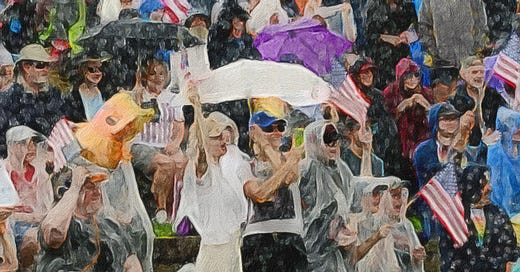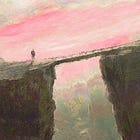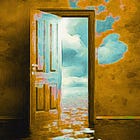the alchemy of collective witnessing
/rōot/ awakenings post # 25 - on shared experiences, embodied wisdom, and relational healing
This week, my social media feed went from being an endless scroll of heartbreak to an inspiring tableau of hope.
Early in the week, unable to look away, I watched video after video of immigrants and the people who love them being met with violence and suppression by ICE and other law enforcement. Children clutching their parents. Families torn apart in parking lots. Communities watching their neighbors disappear. Each image landed in my chest like a stone, the weight accumulating until I was constantly on the verge of tears, carrying a heaviness that made it hard to breathe fully.
These are people who came to this country like my own parents did—seeking to create a better life for themselves and their children. Hard-working people being vilified, disappeared, and met with the kind of state violence that leaves witnesses traumatized and communities in terror. The cruelty was designed to be witnessed, designed to send a message, designed to silence those of us watching from our screens in isolation.
Last night, finally, the tears came. Not from despair. But from hope.
As I scrolled through my feed, the images conveyed city after city—across all fifty states, and around the world—packed with people showing up to protest in the name of those who couldn't. Bodies filling public spaces, voices raised together, rejecting the coronation of cruelty and saying 'no kings' to a leader who rules through fear, deportation, and executive order, rather than governs by consent.
The contrast was stark. A week that had started with feelings of isolation and terror, ended with a reminder that in the face of erasure, oppression, and dehumanization, we can choose care, connection and sacred resistance.
There's something powerful that happens when we step into a crowd of people who refuse to look away from the pain and suffering of others. Our chest, which has been tight for days with the weight of what we've been carrying alone, suddenly expands. The hypervigilance that has become our baseline softens just enough to remember what it feels like to breathe fully. Our nervous systems which have been on high alert for days or weeks or months, begin to relax in the safety of community. To be clear, what we’re experiencing isn't relief because the circumstances that brought us together haven't changed. It’s something else entirely.
This is the alchemy of collective witnessing.
This is what white supremacy and colonialism have tried to make us forget. But deep within our bodies we've continued to carry this ancient wisdom passed down from the generations before us who learned from observing the natural world that healing rarely happens in isolation. That sharing the truths of our lived experiences is a powerful communal practice that leads to healing.
In nature, no organism processes toxins alone. When a tree is under attack from insects or disease, it sends chemical signals through mycorrhizal networks that connect forest floors. The entire ecosystem responds, sharing resources and distributing stress across the whole system. The individual tree's survival depends not on its ability to withstand harm in isolation, but on the network's capacity to hold and transform what threatens life.
Our nervous systems operate on similar principles. When we witness state-sponsored violence, environmental destruction, or any other form of systemic harm, our bodies crave connection with others who feel the same pain. It’s an acknowledgment of our shared experience and the innate wisdom of our nervous systems creating the conditions needed for collective healing through co-regulation. Our impulse to gather with others in this moment when our democracy is being threatened isn't just political—it's biological.
The alchemy that moves us from private despair to collective witnessing is powerful because it shifts the narrative from, I am alone with this terrible knowledge, to we are together in this truth. In these spaces the signs people carry become intentions. The chants become incantations. And the simple act of showing up becomes a form of sacred resistance that says: we will witness this betrayal together and refuse to let it kill our spirit.
As I read through the comments on my feed last night, it was clear that fear had metabolized into hope, leaving us carrying something different in our bodies. Not the false comfort of denial or the brittle armor of cynicism, but the lived knowledge that we are not alone in our outrage, not alone in refusing to look away, not alone in our commitment to protecting what is sacred. That despite being gaslit by our government and mainstream media for months, we can take comfort in knowing that others see what we see.
This is the medicine our communities need right now—not the bypassing of difficult realities, but recognizing that meeting this moment requires more than individual resilience. In a culture that insists we should be able to process our pain in isolation, gathering to witness together becomes a radical act of care—for ourselves, for each other, and for those who are suffering the most.
Gathering together doesn’t erase the trauma or solve the crisis. But every time we choose to come together in community with others, we’re reminded that we were never meant to carry our pain alone. That our nervous systems know how to regulate themselves through proximity to others who see what we see. That collective witnessing is both sacred resistance and a profound healing practice that has the capacity to sustain us and carry us forward with hope instead of despair.
a compassionate reframe
We've been conditioned to believe that carrying difficult truths alone makes us strong, that witnessing injustice in isolation is somehow noble, that our ability to process trauma on our own is a measure of our resilience. This conditioning runs so deep that when we feel overwhelmed by what we're seeing—the videos, the violence, the systematic cruelty—we often judge ourselves for needing others to help us process what we're witnessing.
But the tightness in our chest, the constant edge of tears, the hypervigilance that becomes our baseline—these aren't signs of personal weakness. They're signals that we're trying to hold more than any individual nervous system was designed to carry. Our bodies know what our culture has forgotten: that healing happens in relationship and transformation occurs through collective alchemy rather than individual endurance.
When we gather to witness together, we're not just engaging in political action—we're returning to an ancient knowing about how communities heal from collective trauma. We're remembering that the antidote to isolation isn't more individual strength, but shared presence. That moving from I am alone with this terrible knowledge to we are together in this truth isn't weakness—it's wisdom.
reflection prompts
In this moment of moving from isolation to collective witnessing:
What have you been carrying alone that your nervous system is telling you needs to be shared?
Whether you gathered with others yesterday or witnessed it through social media—what did you notice in your body? What shifted between isolation and connection?
How has witnessing injustice in isolation affected your spirit, and what might change if you viewed witnessing as a collective practice?
What does it mean to you that your impulse to gather with others during crisis is actually biological wisdom rather than political strategy?
Where are you already experiencing the alchemy of collective witnessing in your life—even in small ways?
one final thought
The healing isn't in having all the answers or fixing everything we witness. The healing is in the recognition that we don't have to carry these terrible truths alone—that there are others whose hearts break at the same injustices, others whose nervous systems seek the same co-regulation, others who refuse to let cruelty happen in silence. When we witness together, we're not just resisting harmful systems—we're practicing the very medicine our communities need: the remembering that we were never meant to process collective trauma in isolation, and that our coming together transforms both the story we tell and the spirit we carry forward.









My wife and I had discussed whether our time yesterday would be better spent in prayer and meditation, or participating in a demonstration. Since our local event started at noon, we did both, deciding that spiritual practice was good preparation and defense against getting too excited (I went to a lot of demonstrations in my youth).
I could feel the despair and fear melting and hope rising, just from being in a large group of people who, like us, wanted to live in the America we believe In, the country we had a scant six months ago. I felt relief and even some joy. And hope.
We do what we can.